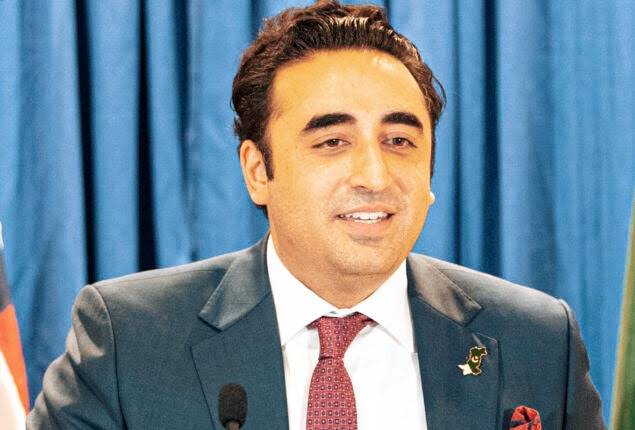
India is planning to invite Pakistan's foreign minister Bilawal Bhutto Zardari to a meeting of the Shanghai Co-operation Organisation (SCO) that New Delhi is hosting in the tourist resort of Goa in May, according to reports in Indian media. The reports, if true, could presage a possible thaw in relations between bitter rivals, both armed with nuclear weapons.
Foreign ministry officials from both countries have not commented on these reports so far.
If a potential invitation is accepted, Bilawal would be the first Pakistani foreign minister to visit India in nearly 12 years. There were reports in late 2022 that Pakistani prime minister Shehbaz Sharif could meet Indian PM Narendra Modi in September 2022, at the sidelines of an SCO summit.
News of the latest invitation comes days after Pakistani PM Shehbaz Sharif called for talks with India over all outstanding issues, including the Kashmir dispute. PM Sharif said that Pakistan had "learnt its lesson", and had asked the United Arab Emirates' (UAE) president Mohammad bin Zayed to help broker a thaw in relations with India.
Just some weeks ago, there were street protests across India over Pakistani foreign minister Zardari's comments about India's PM Modi, at the sidelines of United Nations Security Council meeting. FM Zardari called Modi the "butcher of Gujarat", and in response his Indian counterpart called Zardari's comments "uncivilised".
Pakistan and India are "traditional adversaries" who have fought three wars and many other military skirmishes since both attained independence from British colonial rule in 1947. The disputed Himalayan region of Jammu and Kashmir was the root cause of two of those wars.
In February 2019, both countries launched limited airstrikes against each other after India blamed an alleged militant group in Balakot responsible for a terror attack that killed dozens of Indian paramilitary soldiers. Former US secretary of state Mike Pompeo has claimed, in his memoir, that India and Pakistan came extremely close to nuclear war at that time.
Tensions flared again in August 2019, when India unilaterally revoked the autonomous status of Jammu and Kashmir state, making it a "union territory" that is under direct rule from New Delhi. Recently, Pakistani prime minister Shehbaz Sharif said New Delhi's actions continued to result in "flagrant" human rights violations there.
Official talks between the two countries have been suspended since then, though there have been some attempts to resume negotiations through backdoor diplomacy. The UAE brokered the last attempt in 2021, which is why PM Sharif has sought the support of UAE's president in facilitating a revival of talks.
Foreign ministry officials from both countries have not commented on these reports so far.
If a potential invitation is accepted, Bilawal would be the first Pakistani foreign minister to visit India in nearly 12 years. There were reports in late 2022 that Pakistani prime minister Shehbaz Sharif could meet Indian PM Narendra Modi in September 2022, at the sidelines of an SCO summit.
Rocky relations
News of the latest invitation comes days after Pakistani PM Shehbaz Sharif called for talks with India over all outstanding issues, including the Kashmir dispute. PM Sharif said that Pakistan had "learnt its lesson", and had asked the United Arab Emirates' (UAE) president Mohammad bin Zayed to help broker a thaw in relations with India.
Just some weeks ago, there were street protests across India over Pakistani foreign minister Zardari's comments about India's PM Modi, at the sidelines of United Nations Security Council meeting. FM Zardari called Modi the "butcher of Gujarat", and in response his Indian counterpart called Zardari's comments "uncivilised".
Nuclear rivals
Pakistan and India are "traditional adversaries" who have fought three wars and many other military skirmishes since both attained independence from British colonial rule in 1947. The disputed Himalayan region of Jammu and Kashmir was the root cause of two of those wars.
In February 2019, both countries launched limited airstrikes against each other after India blamed an alleged militant group in Balakot responsible for a terror attack that killed dozens of Indian paramilitary soldiers. Former US secretary of state Mike Pompeo has claimed, in his memoir, that India and Pakistan came extremely close to nuclear war at that time.
Tensions flared again in August 2019, when India unilaterally revoked the autonomous status of Jammu and Kashmir state, making it a "union territory" that is under direct rule from New Delhi. Recently, Pakistani prime minister Shehbaz Sharif said New Delhi's actions continued to result in "flagrant" human rights violations there.
Official talks between the two countries have been suspended since then, though there have been some attempts to resume negotiations through backdoor diplomacy. The UAE brokered the last attempt in 2021, which is why PM Sharif has sought the support of UAE's president in facilitating a revival of talks.

